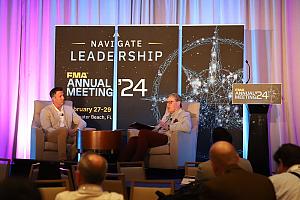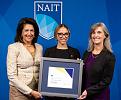Vice-President
- FMA
- The Fabricator
- FABTECH
- Canadian Metalworking
Understanding lenders simplifies financial transactions
Startup companies can streamline the lending process with these four keys
- By Ken Hurwitz
- June 11, 2018
Finding financing for a start-up business certainly can be a challenge, and there are many factors that need to be evaluated. It is important to know what lenders look for in a new owner, but it is just as important to understand that there are options beyond traditional financial institutions.
There is no doubt when the market is busy there are a lot of opportunities for experienced and skilled individuals to grow within the manufacturing industry by starting their own shop, so this month I thought it would be a good idea to talk about how an equipment lender will look at a start-up business.
Because I work with an alternative lender, one not owned or operated by a chartered bank, this is a situation I come across quite often and, therefore, have unique perspective on how these deals get done.
If you look at any truly successful owner-operated Canadian manufacturer, they typically have a common history: they all started out on the bottom.
Skill were developed and honed on the shop floor to a point where they eventually started running a shop as someone else’s plant manager. Then at some point, they all came to the same realization that they either can continue to run someone else’s business, which for many is a secure and successful career, or open their own shop.
This is no easy decision when you consider having to operate within an industry that is unregulated and fiercely competitive, in which even a few cents per part could mean the difference between winning or losing business.
Secure Financing Early
Once the decision has been made to go out on your own, there will an immediate need to source funding for start-up costs, which include setting up a shop, employees, tooling, materials, and of course equipment.
Many factors are involved in securing financing and establishing a successful business. Here are a few of the most important factors:
1. Owners personal credit and net worth.
The first thing a lender will look at is the personal credit of the owner of the new business entity. These personal reports provide a significant amount of information about the individual, including how much credit they have been extended either by credit card companies or banks, and, most importantly, their repayment history.
These reports also provide information for any legal and money collection issues. It is important for any applicant to know the information on their credit report, and for it to be clear of any negative activities. Something as simple as making the minimum monthly payments on a credit card, and keeping it up to date, shows a credit analyst the importance a person places on living up to payment obligations.
2. Owners net worth.
The lender will next want the potential new owner to have a substantial of net worth. Starting a business in the manufacturing industry is an expensive proposition. The best way to demonstrate net worth is by being a homeowner. This shows there has been a history of earning income as well as planting roots in an area with a long-term commitment.
The ancillary benefit of home ownership, particularly when the property has equity, is that the lender knows there is access to additional capital, if necessary.
3. Business plan.
A solid business plan needs to be created detailing where the new company will operate, start-up costs, and how much capital will be required to get the business running. The anticipated sales for the first few years should also be planned out.
A properly prepared and well laid out business plan will provide lenders with some additional comfort that the borrower has an excellent understanding of what it will take to be successful. It provides a forum where they can detail their experience and demonstrate their knowledge of the industry.
Lots of planning is required to start a new business and, in particular, for getting financing in place for the necessary manufacturing equipment. The normal inclination for a start-up business is to minimize cost wherever possible, but when it comes to securing a lender for equipment, this may not be the best strategy.
4. Asset selection.
Lenders look closely at what is actually being financed. When it comes to machine tools, anyone with industry knowledge knows a good, brand-name machine tool has an excellent re-sale value, which, in this case, is of the upmost importance.
A lender’s first concern is exit strategy. In the event the deal goes badly, they want a comfort level knowing the asset can be re-sold with relative ease, in a short period of time, and a that significant portion of the loan will be recovered.
Financial institutions that concentrate on particular industries will have in-house specialists to provide internal evaluations and evaluate the asset itself. If the equipment is a brand-named, quality machine tool, they will know that if the deal goes bad, and the machine is re-sold, the true financial exposure of the deal is only a small percentage of the actual cash outlay.
Because any transaction for a new business requires a deposit, the risk is mitigated even further, but it is the knowledge of the equipment that is the main difference between doing business with an alternative lender, who has industry experience, and a traditional one such as a chartered bank.
When it comes to getting financing from a bank, the quality of the asset, and, in turn, the perceived re-sale value, factors very little when the applicant is reviewed, and, therefore, the credit department may struggle to get these types of transaction approved.
And, while reducing the transaction size by buying inexpensive equipment may be the path of least of resistance, for a lender who understands and values quality machinery, it may actually make them less interested in the transaction.
Ken Hurwitz is senior account manager, Blue Chip Leasing Corp., 416-614-5878, www.bluechipleasing.com.
subscribe now


Keep up to date with the latest news, events, and technology for all things metal from our pair of monthly magazines written specifically for Canadian manufacturers!
Start Your Free SubscriptionAbout the Author

Ken Hurwitz
41 Scarsdale Road Unit 5
Toronto, M3B2R2 Canada
416-499-2449
- Industry Events
MME Saskatoon
- May 28, 2024
- Saskatoon, SK Canada
CME's Health & Safety Symposium for Manufacturers
- May 29, 2024
- Mississauga, ON Canada
DiPaolo Machine Tools Open House 2024
- June 4 - 5, 2024
- Mississauga, ON Canada
FABTECH Canada
- June 11 - 13, 2024
- Toronto, ON Canada
Zoller Open House & Technology Days 2024
- June 12 - 13, 2024
- Ann Arbor, MI




















